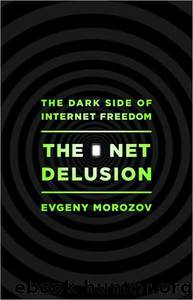The Net Delusion by Evgeny Morozov

Author:Evgeny Morozov
Language: eng
Format: mobi, epub
Tags: Non-Fiction, Politics
ISBN: 9781586488741
Publisher: PublicAffairs
Published: 2010-11-16T10:00:00+00:00
No Such Thing as Virtual Politics
The danger that “slacktivism” poses in the context of authoritarian states is that it may give young people living there the wrong impression that another kind of politics—digital in nature but leading to real-world political change and the one underpinned entirely by virtual campaigns, online petitions, funny Photoshopped political cartoons, and angry tweets—is not only feasible but actually preferable to the ineffective, boring, risky, and, in most cases, outdated kind of politics practiced by the conventional oppositional movements in their countries. But despite one or two exceptions, this is hardly the case at all. If anything, the entertainment void filled by the Internet—the ability to escape the gruesome and boring political reality of authoritarianism—would make the next generation of protesters less likely to become part of traditional oppositional politics. The urge to leave the old ways of doing politics behind is particularly strong in countries that have weak, ineffectual, and disorganized opposition movements; often the impotence of such movements in their fight against the governments generates more anger among the young people than the governments’ misdeeds. But whether we like it or not, such movements are often the only hope that such societies have. Young people have no other choice but to join in and try to improve them. Denouncing their governments and applying for permanent residence in Twitter-land is not an option likely to reinvigorate the moribund political process in many of these countries.
“In terms of their impact [on the Arab world, new media] seem more like a stress reliever than a mechanism for political change,” writes Rami Khouri, editor-at-large of Lebanon’s the Daily Star, who fears that the overall impact of such technologies on political dissent in the Middle East might be negative. “Blogging, reading politically racy Websites, or passing around provocative text messages by cellphone is ... satisfying for many youth. Such activities, though, essentially shift the individual from the realm of participant to the realm of spectator, and transform what would otherwise be an act of political activism, mobilizing, demonstrating or voting into an act of passive, harmless personal entertainment.” Mr. Khouri may be slightly overstating the case—digital activists in the Middle East can boast of quite a few accomplishments, particularly when it comes to documenting police brutality—but his overall concern about the long-term effects of digital activism on politics at large is well-justified.
Seeing how the worlds of offline and online politics collide in the case of Belarus, my home country, I do detect a certain triumphalism about online politics among the younger generation. Many young people, frustrated by the inability of the opposition to mount a challenge to the country’s tough ruler, are beginning to wonder why they should even bother with poorly attended town halls, rigged elections, exorbitant fines, and inevitable jail time if the Internet allows doing politics remotely, anonymously, and on the cheap. But this has proved no more than utopian dreaming: No angry tweets or text messages, no matter how eloquent, have been able to rekindle
Download
This site does not store any files on its server. We only index and link to content provided by other sites. Please contact the content providers to delete copyright contents if any and email us, we'll remove relevant links or contents immediately.
| Anarchism | Communism & Socialism |
| Conservatism & Liberalism | Democracy |
| Fascism | Libertarianism |
| Nationalism | Radicalism |
| Utopian |
The Secret History by Donna Tartt(16627)
The Social Justice Warrior Handbook by Lisa De Pasquale(11489)
Thirteen Reasons Why by Jay Asher(7788)
This Is How You Lose Her by Junot Diaz(5775)
Weapons of Math Destruction by Cathy O'Neil(5038)
Zero to One by Peter Thiel(4824)
The Myth of the Strong Leader by Archie Brown(4789)
Promise Me, Dad by Joe Biden(4449)
Beartown by Fredrik Backman(4420)
Stone's Rules by Roger Stone(4417)
How Democracies Die by Steven Levitsky & Daniel Ziblatt(4399)
The Fire Next Time by James Baldwin(4343)
100 Deadly Skills by Clint Emerson(4079)
A Higher Loyalty: Truth, Lies, and Leadership by James Comey(4033)
Rise and Kill First by Ronen Bergman(4012)
The David Icke Guide to the Global Conspiracy (and how to end it) by David Icke(3883)
The Farm by Tom Rob Smith(3872)
Secrecy World by Jake Bernstein(3783)
The Doomsday Machine by Daniel Ellsberg(3732)
